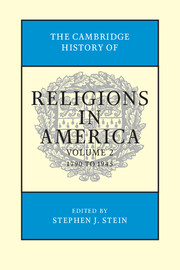Book contents
- Frontmatter
- Contents
- Contributors
- Editor's Introduction
- SECTION I RELIGION IN NORTH AMERICA
- SECTION II RELIGIONS IN THE NEW NATION, 1790–1865
- SECTION III CHANGING RELIGIOUS REALITIES
- SECTION IV RELIGIOUS RESPONSES TO MODERN LIFE AND THOUGHT
- 21 Religion and Immigration, 1865–1945
- 22 Religion and the Modern City, 1865–1945
- 23 Religious Responses to Industrialization, 1865–1945
- 24 Religious Responses to Modern Science, 1865–1945
- 25 Religious Responses to Philosophy in America, 1865–1945
- 26 Fundamentalism
- 27 Religiously Informed Social Reform and Reaction in the Era of the Great Depression
- 28 Nativism from the New Republic to the Cold War
- 29 Between God and Caesar: World War I and America's Religious Communities
- 30 World War II and America's Religious Communities
- SECTION V COMPARATIVE ESSAYS
- SECTION VI RELIGION AND DIVERSE AREAS
- Index
- References
27 - Religiously Informed Social Reform and Reaction in the Era of the Great Depression
from SECTION IV - RELIGIOUS RESPONSES TO MODERN LIFE AND THOUGHT
Published online by Cambridge University Press: 28 July 2012
- Frontmatter
- Contents
- Contributors
- Editor's Introduction
- SECTION I RELIGION IN NORTH AMERICA
- SECTION II RELIGIONS IN THE NEW NATION, 1790–1865
- SECTION III CHANGING RELIGIOUS REALITIES
- SECTION IV RELIGIOUS RESPONSES TO MODERN LIFE AND THOUGHT
- 21 Religion and Immigration, 1865–1945
- 22 Religion and the Modern City, 1865–1945
- 23 Religious Responses to Industrialization, 1865–1945
- 24 Religious Responses to Modern Science, 1865–1945
- 25 Religious Responses to Philosophy in America, 1865–1945
- 26 Fundamentalism
- 27 Religiously Informed Social Reform and Reaction in the Era of the Great Depression
- 28 Nativism from the New Republic to the Cold War
- 29 Between God and Caesar: World War I and America's Religious Communities
- 30 World War II and America's Religious Communities
- SECTION V COMPARATIVE ESSAYS
- SECTION VI RELIGION AND DIVERSE AREAS
- Index
- References
Summary
The economic crisis of the Great Depression spurred religiously informed political and social activism in the United States. Many Roman Catholic labor union and social activists in the 1930s drew inspiration from the papal encyclicals of Popes Leo XIII and Pius XI. Among some African American Protestants in the South and North there was also a desire to champion civil rights. American Jews, often sharing the same socially marginal, immigrant backgrounds as Catholics, filled the ranks of social reformers. In contrast to African American Protestants and Catholics, however, religious faith per se played a less explicit role in shaping Jewish activism.
At the same time, many Protestants, whether from mainline or Fundamentalist denominations, loomed large in the ranks of those opposed to organized labor and the expanding role of the federal government in the American economy. Even among Catholics and African American Protestants, there were prominent individuals who condemned progressive social reforms.
This essay will explore the contours of religiously based social activism in the 1930s as well as devote attention to the foes of reform. Many historical accounts of the Great Depression in the United States have slighted the significant role of religious reformers in promoting the fortunes of organized labor and building the New Deal Democratic electoral coalition. If economics cannot be separated from politics, then neither should be examined without accounting for religious belief. In religious faith there is a philosophical framework that individuals use to understand their economic and political systems.
- Type
- Chapter
- Information
- The Cambridge History of Religions in America , pp. 595 - 615Publisher: Cambridge University PressPrint publication year: 2000

